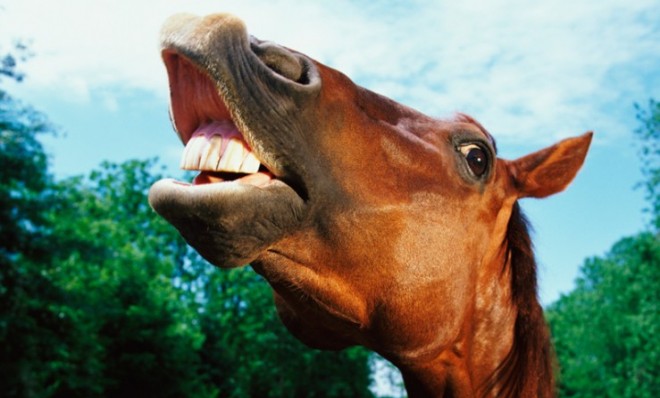6 descriptions of what horse meat actually tastes like
"It is half the price of beef and undeniably delicious."

A free daily email with the biggest news stories of the day – and the best features from TheWeek.com
You are now subscribed
Your newsletter sign-up was successful
Horse meat continues to turn up in beef products all over Europe. On Monday, Swedish furniture-maker Ikea announced that it was withdrawing its famous meatballs from 14 European locations after trace amounts of equine were discovered within them. Just a few days prior, Nestlé was forced to recall two of its beefy pasta products — Buitoni Beef Ravioli and Beef Tortellini — after horse DNA was detected in its beef supply. The scandal has freaked out consumers across the continent, many of whom would never voluntarily purchase horse meat for dinner.
But what, pray tell, does horse flesh actually taste like? Here, six different descriptions:
The International Business Times:
The Week
Escape your echo chamber. Get the facts behind the news, plus analysis from multiple perspectives.

Sign up for The Week's Free Newsletters
From our morning news briefing to a weekly Good News Newsletter, get the best of The Week delivered directly to your inbox.
From our morning news briefing to a weekly Good News Newsletter, get the best of The Week delivered directly to your inbox.
Horse meat varies in color. Meat from younger horses is lighter in color and flavor, while meat from older horses has a deeper color and flavor. Horse meat is lean, typically, and relatively tender. Older horses are considered to have the most tender meat — different than say veal from a cow.
Horse meat is a bit sweet in taste. Some think it is a blend between beef (a cow) and venison (deer). People use it similar to the way they use beef, putting it in sandwiches, or serving it in a slab. The cooking time is generally shorter than that of beef, in part because of its lean qualities.
A 40-year-old woman interviewed by Death and Taxes:
"It's like eating really good beef steak," she said, "I wouldn't have known that it wasn't really good steak if I had just sat down at the table." […] Horses have a lot of muscle, so you'd think a horse as being more active and thus their meat a lot tougher, but I'd wager that the horses they use for meat are just grass grazers. You'd expect the meat to be tougher, but it isn't. There was little marbling in the meat and thus less fat content. It was surprising, although, fish, too, are nearly all muscle, and, overcooking aside, when was the last time you had a tough fish?"
Horse is a versatile meat that lends itself to a variety of preparations. It has more protein, and less fat than lean beef. It tastes somewhat like a mix between beef and venison. It can be a bit sweeter than other red meats, yet still possesses a dense meat flavor with a hint of gaminess.
The Guardian's Alex Renton:
It is half the price of beef and undeniably delicious. I went to a steak tasting at Edinburgh's L'Escargot Bleu bistro at the height of the scandal. Chef and patron Fred Berkmillar had packed in 12 Scottish foodies, cooks, and meat suppliers and gave us rump steaks to try. One was the best 30-day-aged Orkney beef, the other Comtois horse, farmed in the Dordogne.
You could have confused the horse with beef, but its steak — juicy, tender, just slightly gamey — won the fry-off by 12 votes to none.
Unsuspecting American tourists vacationing in France, according to The New York Times:
A free daily email with the biggest news stories of the day – and the best features from TheWeek.com
Some people can't tell the difference between horse and beef. I once overheard an American couple complain in a Paris restaurant that they could not find a decent hamburger in the French capital. When a waiter came by to take their order, he pointed to the "Steak haché (chevaline)" listed on the menu. He did not mention that "chevaline" means horse meat. They ordered it.
Ten minutes later they were all happily munching their horse burgers. If they had known the truth, they would probably have run screaming into the street.
A T-Magazine writer trying raw horse meat in Japan:
…a plate of unfamiliar meats arrived: A dark gathering of raw horse liver and scarlet slices of horse "sashimi." Each equine variant had its own dipping sauce: Sesame oil and sea salt for the liver, a muddle of spicy miso and garlic for the sashimi. I grew up in Kentucky, where we don't eat much horse, raw or otherwise, though after tasting the crisply cut pieces dipped in the salty oil, I'm not sure why. Maybe it comes down to the sound of things. To say a briny, just-shucked oyster tastes like the ocean — well, that sounds pretty nice. Tastes of the paddock or the stable — not so pleasant.
The general consensus? Not bad at all.
So how about it? Would you give horse meat a try?
-
 Bad Bunny’s Super Bowl: A win for unity
Bad Bunny’s Super Bowl: A win for unityFeature The global superstar's halftime show was a celebration for everyone to enjoy
-
 Book reviews: ‘Bonfire of the Murdochs’ and ‘The Typewriter and the Guillotine’
Book reviews: ‘Bonfire of the Murdochs’ and ‘The Typewriter and the Guillotine’Feature New insights into the Murdoch family’s turmoil and a renowned journalist’s time in pre-World War II Paris
-
 Witkoff and Kushner tackle Ukraine, Iran in Geneva
Witkoff and Kushner tackle Ukraine, Iran in GenevaSpeed Read Steve Witkoff and Jared Kushner held negotiations aimed at securing a nuclear deal with Iran and an end to Russia’s war in Ukraine